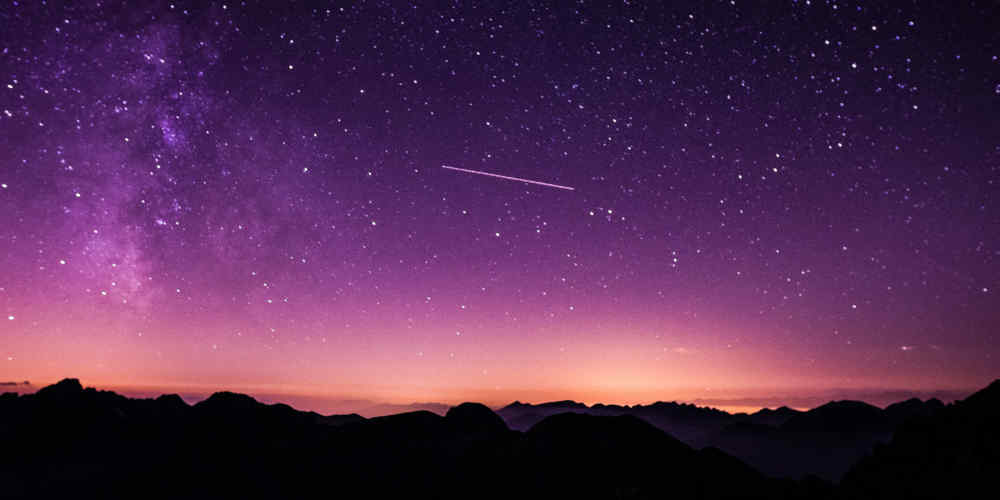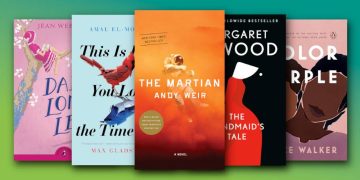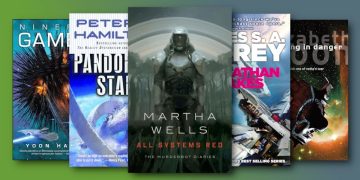Science fiction has never been an easy genre to pin down. Space opera, cyberpunk, science fantasy, and hard sci-fi all exist within one overall label. But which is which? And who writes it all?
Still, science fiction is a genre where you know it when you see it—and there are many fantastic authors working in the genre these days.
This article is about modern sci-fi writers, meaning those who are still active and releasing new works. So even though there are many other big names in science fiction, you won't see them mentioned.
Here are my picks for the best modern sci-fi authors and their various claims to fame as writers of science fiction.
15. Arkady Martine
Primary genres: Science Fiction
Debut novel: A Memory Called Empire (2019)
Notable works: Rose/House (2023)
Arkady Martine's works range from sweeping short stories to grand sci-fi novels. For the latter, she truly proved her skill as a storyteller with the acclaimed Teixcalaan series.
Her first novel, A Memory Called Empire, introduces the character Mahit Dzmare, a mining station ambassador who's assigned to stop an evil empire from governing most of the universe.
And in her follow-up book, A Desolation Called Peace, she puts Mahit into the middle of political conflict.
Science fiction is often epic, but Arkady Martine cleverly applies her knowledge of history to craft a magnificent saga.
14. Tamsyn Muir
Primary genres: Fantasy, Horror, Science Fiction
Debut novel: Gideon the Ninth (2019)
Notable works: Princess Floralinda and the Forty-Flight Tower (2020)
It's possible that Tamsyn Muir's Gideon the Ninth could be the sci-fi equivalent of grimdark fantasy, at least if it wasn't so laugh out loud funny.
That first book in the series is enough to have many fans eagerly awaiting the next title in the trilogy and calling Muir one of the writers to keep a closest eye on for the next few years.
13. Ann Leckie
Primary genres: Fantasy, Science Fiction
Debut novel: Ancillary Justice (2013)
Notable works: Provenance (2017), The Raven Tower (2019), Translation State (2023)
If you haven't already heard of Ann Leckie, you've probably at least heard of Ancillary Justice, which was published in 2013.
Why? It won the Hugo, Nebula, BSFA, Arthur C. Clarke, and Locus Awards, to start. Since then she has published two direct sequels to that novel, another set in the same universe, and a fantasy novel, The Raven Tower.
12. Dennis E. Taylor
Primary genres: Science Fiction
Debut novel: Outland (2015)
Notable works: We Are Legion (We Are Bob) (2016), The Singularity Trap (2018), Roadkill (2022)
Best known for his Bobiverse series, Dennis E. Taylor won Audible's Best Science Fiction Book award in 2016 for the first in the series, We Are Legion (We Are Bob).
The series is about a former tech CEO who, after several unfortunate accidents finds himself floating as a satellite drone in space, decides to start cloning himself.
11. Yoon Ha Lee
Primary genres: Fantasy, Science Fiction, Poetry
Debut novel: Ninefox Gambit (2016)
Notable works: Dragon Pearl (2019), Phoenix Extravagant (2020)
Military science fiction isn't nearly as big as it used to be, but Yoon Ha Lee seems set to change that.
His novel Ninefox Gambit won the Locus Award for Best First Novel in 2017 and began the Machineries of Empire series, which has been popular with both readers and critics.
10. Martha Wells
Primary genres: Fantasy, Science Fiction
Debut novel: The Element of Fire (1993)
Notable works: City of Bones (1995), The Cloud Roads (2011), Razor's Edge: Star Wars Legends (2014), All Systems Red (2017)
Martha Wells kicked off The Murderbot Diaries with All Systems Red in 2017, quickly winning several awards including a Nebula and a Hugo.
Wells followed with several more in the series about a security AI that calls itself Murderbot and really just wants to be left alone to watch its shows in peace.
9. Charles Stross
Primary genres: Fantasy, Horror, Science Fiction
Debut novel: Singularity Sky (2003)
Notable works: The Family Trade (2004), The Atrocity Archives (2004), Halting State (2007)
Charles Stross has been writing since the late 1980s, but it was only in the early 2000s that his work began to make its way to the masses.
His Laundry Files series is my personal favorite, combining James Bond-style science fiction, workplace humor that wouldn't be out of place in a (albeit very strange) sitcom, and Lovecraftian horror.
8. Cixin Liu
Primary genres: Science Fiction
Debut novel: China 2185 (1989)
Notable works: Supernova Era (2003), Ball Lightning (2004), The Three-Body Problem (2007)
Cixin Liu wrote several novels before The Three-Body Problem, but it's that novel that got him recognition in the western world.
It's the rare science-fiction novel that takes place in "the real world" but still conjures ideas and concepts that are terrifying in their enormity. Read that novel, and you'll need to finish the series.
7. Cory Doctorow
Primary genres: Science Fiction
Debut novel: Down and Out in the Magic Kingdom (2003)
Notable works: Someone Comes to Town, Someone Leaves Town (2005), Little Brother (2008), Walkaway (2017)
Some sci-fi authors—and Cory Doctorow is one of them—use their platform as a writer for personal activism. In this case, the Canadian-British writer fights for the liberalization of copyright laws and the Creative Commons organization.
His post-modern novels reflect his cause, often delving into topics like privacy, intellectual property, wealth distribution, and social disparity.
His first novel, Down and Out in the Magic Kingdom, uses a murder mystery as commentary for the wealthy class's exploitation of consent. His Little Brother novels are presented like YA stories to expose intrusions to civil liberties.
Cory Doctorow's stories are great, but when you consider the impact of his activism, his works stand even taller.
6. N. K. Jemisin
Primary genres: Fantasy, Science Fiction
Debut novel: The Hundred Thousand Kingdoms (2010)
Notable works: The Killing Moon (2012), The Fifth Season (2015), The City We Became (2020)
Here we have a skilled writer who isn't afraid to spread her wings and try many things, given her success in both science fiction and fantasy.
N. K. Jemisin made a name for herself as the first author to win the Hugo Award for Best Novel three years in a row (2016–2018).
The awards were given for her Broken Earth series, a science-fiction-fantasy hybrid tale that explores the last remaining humans as they harness an unearthed magic in a post-apocalyptic world.
Amidst themes of social oppression and cultural disparity, her works give light to Afrofuturism and diversity. That's most apparent in The City We Became, in which the lead character is an African artist struggling to find sense in a futuristic New York.
5. Andy Weir
Primary genres: Fantasy, Science Fiction
Debut novel: The Martian (2014)
Notable works: Artemis (2017), Project Hail Mary (2021)
Andy Weir blew up in fame for one novel in particular: The Martian. Yes, the very same book that became the source material for Ridley Scott's blockbuster adaptation where Matt Damon was trapped on Mars.
The Martian is a perfect representation of Weir's style and it placed Weir on the map as a sought-after sci-fi novelist.
His following novels—Artemis and Project Hail Mary—almost have the same structure and themes of The Martian, each one focusing on a lone astronaut fighting against catastrophic phenomena.
Repetitiveness aside, every detail is cinematic and compelling while raising the emotional stakes. The Martian is a modern classic told through log entries, while Artemis and Project Hail Mary are space exploration classics in the making.
4. James S. A. Corey
Primary genres: Science Fiction
Debut novel: Leviathan Wakes (2011)
Notable works: Gods of Risk (2012), Honor Among Thieves: Star Wars Legends (2014), The Churn (2014)
James S. A. Corey doesn't really exist, but is instead a pen name for the team of Daniel Abraham and Ty Franck.
Together they write The Expanse, a series of novels that began with Leviathan Wakes in 2011. If that name sounds familiar, it's because the books became so popular they spawned a TV series of the same name.
3. Peter F. Hamilton
Primary genres: Science Fiction
Debut novel: Mindstar Rising (1993)
Notable works: Pandora's Star (2004), The Dreaming Void (2007), Salvation (2018)
Peter F. Hamilton has been writing even longer than fellow British author Alastair Reynolds, releasing Mindstar Rising, the first novel in his Greg Mandel trilogy in 1995.
It was 2004's Pandora's Star and its 2005 follow-up Judas Unchained that brought him to the attention of many and also fleshed out the Commonwealth universe initially set up by the earlier Misspent Youth.
2. Alastair Reynolds
Primary genres: Science Fiction
Debut novel: Revelation Space (2000)
Notable works: Century Rain (2004), Terminal World (2010), Blue Remembered Earth (2012), Revenger (2016)
Alastair Reynolds began his science fiction career in 2000 with the hard sci-fi novel Revelation Space, which kicked off an entire universe of books.
As someone who holds a PhD in Astronomy, he seems uniquely suited to the world of science fiction, which explains why he has maintained a steady stream of output since that first novel.
1. John Scalzi
Primary genres: Science Fiction
Debut novel: Old Man's War (2005)
Notable works: Redshirts (2012), The Collapsing Empire (2017), The Kaiju Preservation Society (2022)
John Scalzi first made a name for himself with Old Man's War in 2005 and hasn't stopped delivering quality sci-fi since, including the award-winning Redshirts from 2012.
While he doesn't shy away from big ideas and impactful events, an underlying humor in many of his books keeps them from ever becoming unbearably dark.



